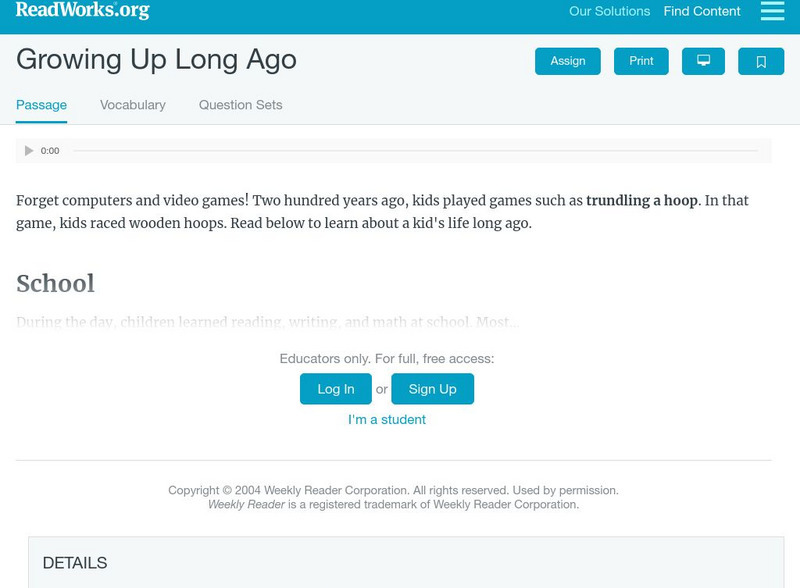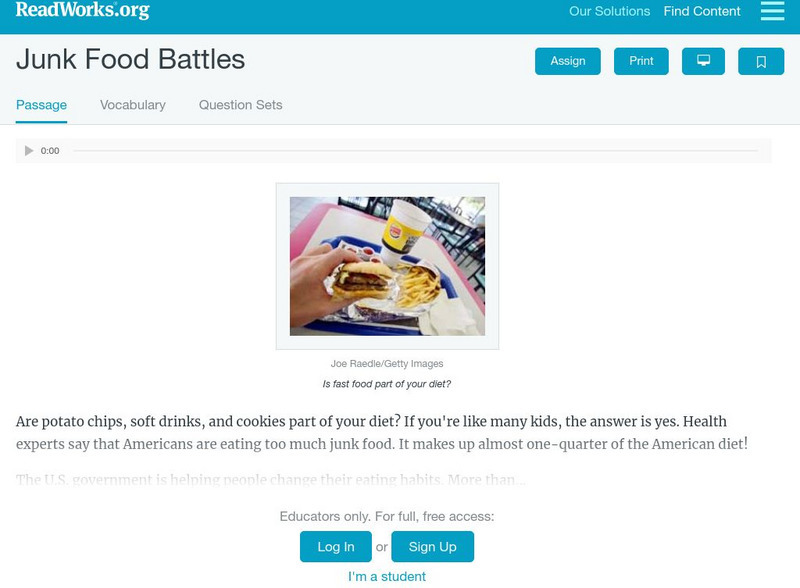Curated OER
Making Points on Election Dilemma
Students define a straight news article, and identify characteristics of an editorial news feature. They read a CNN article that examines the 2000 presidential election, and determine what is factual and what is opinion.
Curated OER
Students as Historians: Investigating the Gulf War
Sixth graders investigate the Gulf War using primary and secondary sources. Students research using a variety of sources including the internet.
Curated OER
Connecticut Folklore: Fact or Fiction
Sixth graders read legends to learn the history of Connecticut in a fun informative way.
University of South Florida
Fcat Express: Teaching Strategies (Reading) [Pdf]
Printable, fifty-five page PDF file of a staff development manual containing strategies for teaching reading. Includes chapters on vocabulary, main ideas and supporting details, author's purpose, chronological order, plot and conflict...
Polk Brothers Foundation Center for Urban Education at DePaul University
De Paul University: Center for Urban Education: Comprehensive Questions: Nonfiction [Pdf]
Questions are provided to help students determine the main idea, topic, and fact versus opinion of a nonfiction piece. Students are prompted to write a summary of an informational text.
Read Works
Read Works: Lessons: Lesson 3: Identifying Facts and Forming Opinions
[Free Registration/Login Required] A lesson plan and materials to teach kindergarten students identify facts and form opinions using the book Animal Smell.
Other
Grade 1 Informative Writing Lessons
Authored by the Tsehai Russell and Della Wright, CLR fellows, this resource provides a 5-day unit of informative writing lessons. Focus lessons related to facts and opinions and paragraph writing. This series is supported by the Academic...
Department of Defense
Do Dea: Contemplation and Argumentation
In this self-guided unit, you will read Romantic and Transcendental literature and you will practice the art of persuasion using rhetorical devices, appeals, and refutation while avoiding logical fallacies. By the end of the unit, you...
University of South Florida
Fcat Express: Fact & Opinion
Strategies to help students recognize the difference between fact and opinion provided by a standardized test preparation site intended for fourth grade. Includes teaching ideas such as analyzing facts and opinions in newspapers, and...
University of South Florida
University of South Florida: Fcat Express: Author's Purpose Activity
Practice identifying author's purpose by recognizing the purpose in titles, understanding the difference between fact and opinion, and identifying the purpose of various forms of writing.
Sam Houston State University
Sam Houston State University: Fact and Opinion Ii Post Test
Students choose the fact and opinion statements in four multiple choice questions and then read two short texts and answer two multiple choice questions about facts and opinions presented in each. Answers are available when exercise is...
Polk Brothers Foundation Center for Urban Education at DePaul University
De Paul University: Center for Urban Education: Natural Gas: An Energy Resource [Pdf]
"Natural Gas: An Energy Resource" is a one page, nonfiction, reading passage about how natural gas is located, drilled for, and sent through pipelines throughout the country to people's homes. It is followed by questions which require...
Polk Brothers Foundation Center for Urban Education at DePaul University
De Paul University: Center for Urban Education: Can Contrast and Evaluate Fact, Opinion [Pdf]
This site provides a poster that will guide students as they contrast and evaluate facts and opinions. Guiding questions and student prompts are provided.
Other
Worsley School: Fact or Opinion?
Learn about distinguishing fact from opinion and then practice this skill with a seven-question assessment.
Polk Brothers Foundation Center for Urban Education at DePaul University
Depaul University: Center for Urban Education: Classify Facts and Opinions [Pdf]
Students will find three lessons about facts and opinions in this learning module. The following topics are linked in the module: contrast and evaluate fact and opinion; classify facts and opinions; and locate and classify facts.
University of Illinois
University of Illinois Extension: Is It What I Think or What I Know? (Fact or Opinion)
This short lesson provides a fairly simple way to teach young students the difference between fact and opinion.
E Reading Worksheets
E Reading Worksheets: Fact and Opinion Worksheets
Fact and opinion practice exercises, answer sheets, and explanation summaries are included on this tutorial site. Worksheets are tiered in levels of difficulty.
E Reading Worksheets
E Reading Worksheets: Reading Activities
An assortment of reading mini-projects are included on this site. Reading skills worksheets and differentiated reading activities are also included.
Read Works
Read Works: Washington Rides Again
[Free Registration/Login Required] An informational text about wax statues of George Washington at Mount Vernon in Virginia. A question sheet is available to help students build skills in identifying fact and opinion.
Read Works
Read Works: Nobel Work
[Free Registration/Login Required] An informational text about Nobel Prizes and prize winners in 2006. A question sheet is available to help students build skills in reading comprehension.
Read Works
Read Works: Growing Up Long Ago
[Free Registration/Login Required] An informational text about the typical life of a child during the 1800's. A question sheet is available to help students build skills in reading comprehension.
Read Works
Read Works: Right On
[Free Registration/Login Required] An informational text about a program called "Do Something About It" designed to teach kids about the Bill of Rights. A question sheet is available to help students build skills in reading comprehension.
Read Works
Read Works: A Constitution for Kids
[Free Registration/Login Required] An informational text about a children's book that translates the Constitution for kids. A question sheet is available to help students build skills in reading comprehension.
Read Works
Read Works: Junk Food Battles
[Free Registration/Login Required] An informational text about the importance of eating nutritious foods. A question sheet is available to help students build skills in reading comprehension.
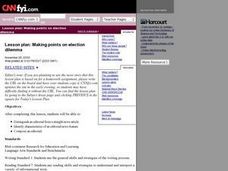

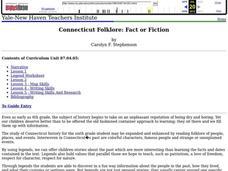
![Fcat Express: Teaching Strategies (Reading) [Pdf] Study Guide Fcat Express: Teaching Strategies (Reading) [Pdf] Study Guide](https://d15y2dacu3jp90.cloudfront.net/images/attachment_defaults/resource/large/FPO-knovation.png)
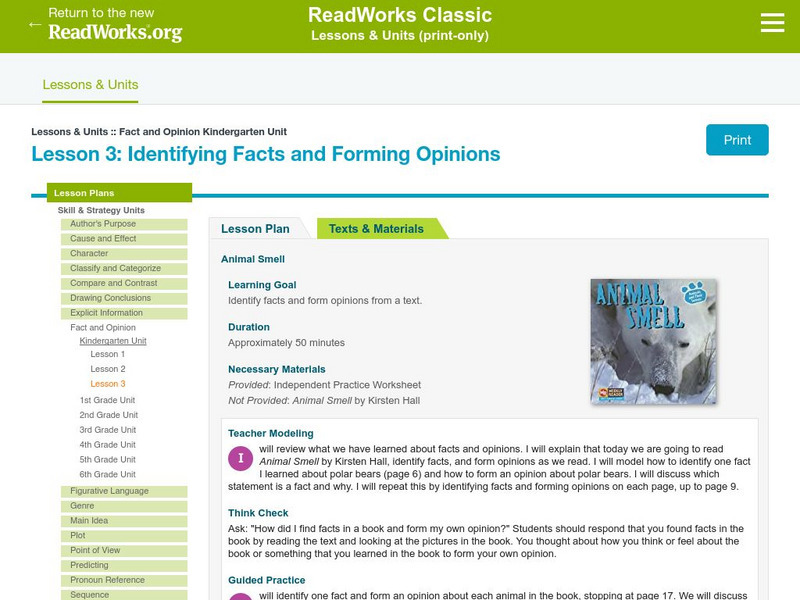
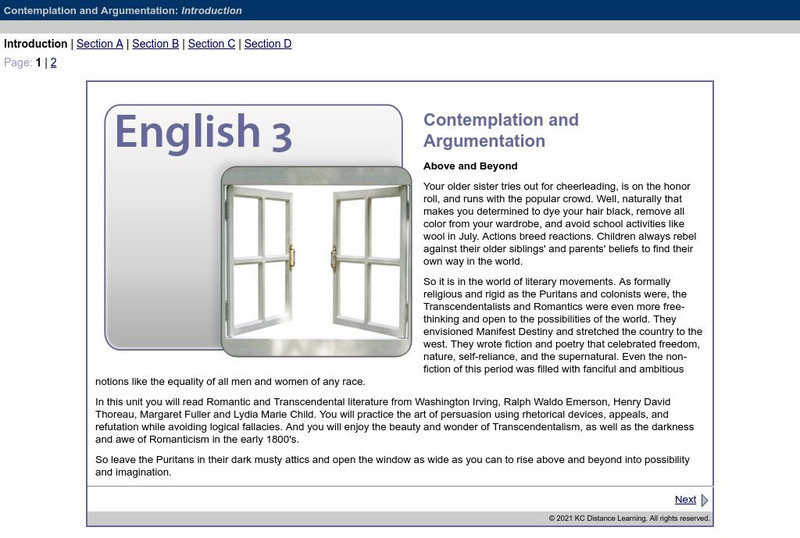

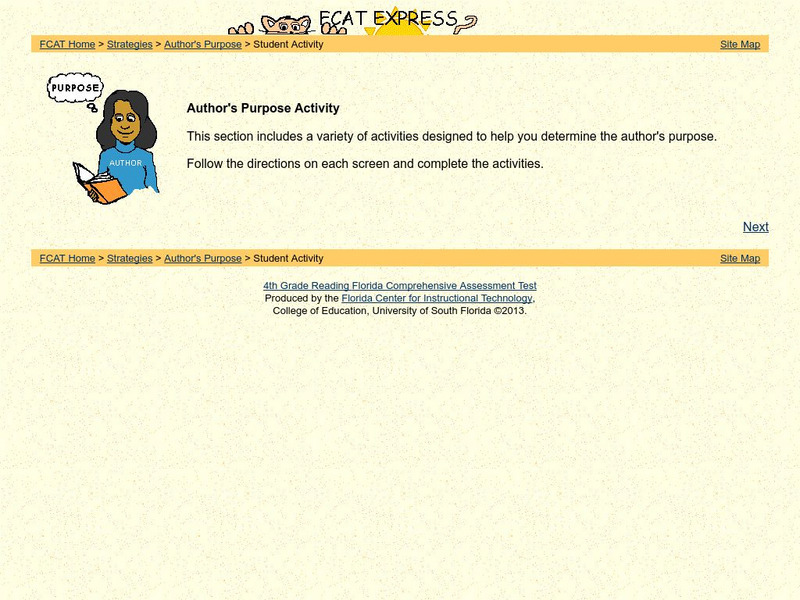


![Depaul University: Center for Urban Education: Classify Facts and Opinions [Pdf] Unit Plan Depaul University: Center for Urban Education: Classify Facts and Opinions [Pdf] Unit Plan](https://content.lessonplanet.com/knovation/original/119988-719af6c927af61affa025c27754c7fae.jpg?1661787067)



